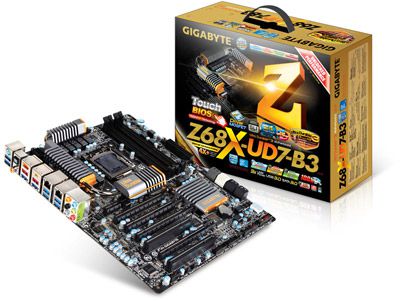- Qualcomm Launches Snapdragon 4 Gen 2 Mobile Platform
- AMD Launches Ryzen PRO 7000 Series Mobile & Desktop Platform
- Intel Launches Sleek Single-Slot Arc Pro A60 Workstation Graphics Card
- NVIDIA Announces Latest Ada Lovelace Additions: GeForce RTX 4060 Ti & RTX 4060
- Maxon Redshift With AMD Radeon GPU Rendering Support Now Available
GIGABYTE Announces Native PCIe 3.0 Support On Current 6-Series Motherboards
We’re a few days late getting this bit of information posted but it may prove no less exciting for owners of current GIGABYTE 6-series motherboards. The company has announced that Intel’s upcoming 22nm Ivy Bridge CPUs expected in the first quarter of 2012 will be a direct drop in upgrade for LGA1155 systems, but we’ve known that for a while. What we find out now is that many will feature native support for PCI Express 3.0, simply by updating the BIOS.
For those who aren’t up to speed, the new interface will allow for twice the theoretical bandwidth of PCIe 2.0, marking a hefty increase to 32 GB/s. It also significantly reduces the amount of overhead by using a new encoding technique called scrambling that allows for almost the full 8GT/s to be utilized whereas PCIe 2.0 had an overhead of about 20%. There are other improvements as well but I’ll let you track down the information instead of hashing it out here.
Some of you might be getting excited at this point but just think for a moment. The current interface operates nearly the same whether a GPU is run at x8 or x16, so we haven’t really pushed the bandwidth envelope to the point where more throughput is truly needed, but this certainly does allow for future proofing (if such a thing truly exists).

A quick comparison between the GPUs available when PCIe 2.0 was officially released (NVIDIA 8800 Ultra/AMD 2900XT) and now makes me wonder where we’ll be in another 4 years. With the above taken into consideration and the fact that we have yet to see any PCIe 3.0 devices, this release is mostly just flashy buzz words until then, but there’s no telling where GPUs will end up over the lifespan of the new interface. The speed with which SSDs are developing, that’s another matter, and probably one of the few devices that could take advantage of the increased bandwidth.
The press release contains a full list of motherboards that support both features so if you want to know if your board makes the cut, check the source link.



